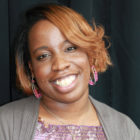Days after Donald Trump’s unexpected presidential victory, local grassroots advocates for racial and social justice began to look past his win to the next step: how to advance a progressive agenda under a president who is hostile to their issues.
The Chicago Reporter interviewed Charlene Carruthers, national director of the Black Youth Project 100; Candace Coleman, an organizer with the disabilities rights group Access Living; Erik Glenn, executive director of the Chicago Black Gay Men’s Caucus; Hoda Katebi, communications coordinator for the Chicago office of the Council on American-Islamic Relations (CAIR); Steve Moon, organizing director of the Chicago office of Asian Americans Advancing Justice; Jane Ramsey, a member of Chicago Women Take Action; and Analia Rodriguez, executive director of the Latino Union of Chicago.
They told the Reporter that coalition-building will be key, and some of the organizers say that requires an understanding of how the economic and social system also oppresses “marginalized white communities.”
What concerns or fears do you have about a Trump presidency?
Moon, Asian Americans Advancing Justice: We’ve already seen this flare-up of violence [against people of color] in the immediate 24, 48 hours after the election. What we’re seeing is a white racist backlash and that the foundation of this nation has been built on white supremacy and xenophobia.

Rodriguez, Latino Union: What I’m scared of the most is for my friends and the people that I work with who are undocumented. The biggest threat is what Trump has created on the ground: People are making comments that are more openly racist or sexist, and now it’s OK, because we have a president-elect who has been saying those things. I look over my shoulder when I walk down the street because I’m afraid of being physically assaulted by someone, not only because I’m an immigrant but because I’m a woman.
Carruthers, BYP100: It’s not about fear. But what is possible is for access to health care to be completely wiped out. For the already limited access to abortion care to be eliminated. And for people who are undocumented or immigrants to be criminalized and hyper-targeted. We just saw [stocks rise] for private prison corporations after Trump’s election. That means there’s even more incentives for those beds to be filled and for prisons to be places of production. All those are things that can happen.
Glenn, Black Gay Men’s Caucus: Our work is on health equity for black, gay, bisexual, and same-gender loving men in Chicago, and the way we do that is by making sure the public health industry is really attending to the variety of needs that men in our community have. So I’m troubled by the rhetoric around eradicating the Affordable Care Act.

Katebi, CAIR: Trump gives white supremacists encouragement to be more vocal. A lot of Muslim women who wear a hijab are thinking about what it means now, especially when Trump supporters had free rein to attack protestors at rallies and feel protected.
Ramsey, Chicago Women Take Action: Obviously, I worry about the preservation of Roe v. Wade, Obamacare, the important work of Planned Parenthood. The classic women’s issues. But immigration is a women’s issue–that families not be deported, not be separated. Voting rights is a women’s issue–that people have access to express their voices through voting. Fighting bigotry is a women’s issue–that people not be victims of hate crimes based on their color of skin or their faith. Those are basic human rights.
What will organizing look like going forward?
“We have this figure now [in Trump] who helps us see how our causes align and how the fight for social and economic justice isn’t always so dissimilar between our communities.” – Erik Glenn, Chicago Black Gay Men’s Caucus
Moon: What the Asian-American community and Advancing Justice are going to need is to learn from other communities of color. What are the strategies and tactics they use? Specifically, some organizations in the Latino community have really worked at what it means to respond to threats [from] immigration authorities, and also just how to respond to violence in a different way. The black young leaders in Chicago are doing tactics around direct action and messaging and really changing the narrative of our city and nation. There’s a lot that can be learned from each other.

Glenn: Coalitions are really going to be the order of the day. We know that to attend to health needs, we need to expand outside of public health. We’re talking about workers’ rights, raising the minimum wage, eradicating mandatory minimum [prison] sentencing, decriminalizing marijuana. Whereas before [those issues] may have seemed like something at the side because of limited capacity, now, we have to work on how can we grow our capacity so we can work on those issues.
Katebi: We’ve always been at the forefront of addressing the hate crimes that happen in our community. We see being more proactive and trying a lot of different tactics. We are ready to organize with other organizations that have similar interests [in] defending civil rights and fighting bigotry.

Coleman: We need to really start engaging people on a community level outside of social media. Not just sign a petition, but really build a community through love with people, regardless of whether they think like you. We have to go back to what it was like before technology took over our lives: actually talking to people, eating together at the same table, engaging with one another.
Rodriguez: We have to keep going forward on the work we were already doing, and make sure that what we’ve won we keep. But there has to be a lot of healing, meetings, and holding each other. There also has to be a lot of education. We cannot let fear stop us, so we have to learn and be able to verbalize our fears because once you can identify that, you can identify solutions. On a macro level, we need to start understanding why this happened and not just say that it’s us against them. There are systems that are oppressing everyone in this country, and I’m talking about marginalized white communities. Our white allies need to be a part of this, because you’re more likely to pay attention to what I’m saying if I look like you.
Ramsey: In our organizing and coalition-building, we also need to reach out to the people in the part of the country we do not know, the people who supported Trump. This includes women in rural communities. There will be a lot of effort from all of our communities, to listen – because in organizing we have to listen — and to understand. We need to share what we’re about and fight where our interests are together.
Why is building coalitions so important now?

Carruthers: In addition to recognizing that it has to be done, we’re in a much better place for us to come together now, not in the guise of unity alone, but with the critical analysis of what’s in front of us. We can’t rely on the politics of respectability or narratives of criminality. But we actually have to know that centering on the people who are the most vulnerable and marginalized will actually improve the lives of everybody.
Glenn: People who have existed in silo movements have a much better awareness of what the struggles of others look like because of this moment. It’s not so much because we have a common enemy, but a common cause. We have this figure now [in Trump] who helps us see how our causes align and how the fight for social and economic justice isn’t always so dissimilar between our communities. We can work on all of this together and at the same time. And that includes white working-class men. There are issues that are salient to them, too.

Moon: I don’t think there’s any way we secure the rights of our communities under this president, with a governor who has cut services to working-class people, and really win equity and justice, unless our communities are really in solidarity with each other.
Ramsey: We understand there’s no victory we’ve won in Illinois, in Chicago, or nationally, on any social justice issue, that any of us have won alone. We have to, by definition, build coalitions in order to push an agenda forward.
What do you tell people who feel discouraged by Trump’s victory?
Katebi: I tell them that I love them. That we got this and we’re going to fight this.

Ramsey: It’s OK to be grieving. It’s not only OK, it’s necessary. Then we need to turn that into the depth of commitment we have for people, for peoples’ rights, and the sense of the vision that this is a great country because of its diversity and respect for humanity. It’s that vision we need to make sure we protect and preserve.
Moon: You’re not alone. Our communities have a rich history of resistance and we’ve always supported each other and protected each other. That’s not going to stop now.
Carruthers: I’m actually pretty excited about what we can build together, moving forward. I’m not dismayed or distraught. There’s a ton of opportunities ahead of us to do really important work.
This article has been edited for length and clarity.



Coalition building will need to expand to the climate crisis network as well. I wrote a blog article recently with a video by climate crisis organizers that showed how important it was to reach out to people in poverty. See it at http://tutormentor.blogspot.com/2016/10/climate-crisis-environmental-racism.html